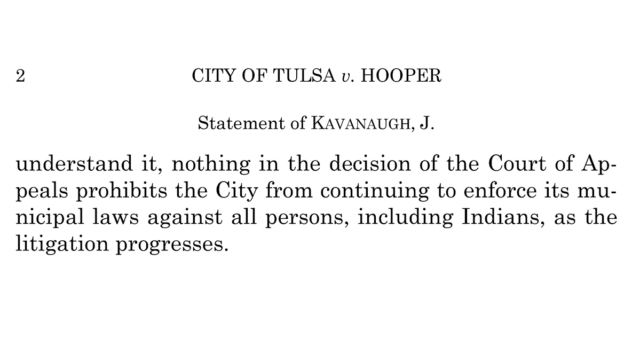

A significant case about whether cities and towns in eastern Oklahoma have jurisdiction to enforce local laws against tribal citizens in municipal court remains in federal district court, but a statement released Friday by a pair of U.S. Supreme Court justices drew strong remarks from both Gov. Kevin Stitt and Cherokee Nation Principal Chief Chuck Hoskin Jr.
In a statement written by Justice Brett Kavanaugh and joined by Justice Samuel Alito, the Supreme Court denied the City of Tulsa’s application for a stay in the Hooper v. City of Tulsa case, which is currently on remand in U.S. District Court for the Northern District of Oklahoma. The case faces further proceedings consistent with the 10th Circuit Court of Appeals’ opinion from June, which overturned the district court’s initial dismissal by ruling that Section 14 of the Curtis Act — a federal law predating Oklahoma statehood — no longer grants jurisdiction to Tulsa to enforce city rules and regulations.
Justin Hooper, a Choctaw Nation citizen who received a City of Tulsa speeding ticket in 2018, filed the federal lawsuit arguing that, because he is a tribal citizen, the Tulsa Municipal Court has no jurisdiction to adjudicate the traffic violation because it occurred on land deemed to be an Indian Country reservation following the 2020 U.S. Supreme Court decision in McGirt v. Oklahoma.
After the district court initially dismissed the case in Tulsa’s favor, Hooper appealed to the 10th Circuit, which said the district court erred and needs to hear the case further. The City of Tulsa requested a formal stay of the appellate ruling, which was briefly granted before ultimately being rejected by Kavanaugh and Alito on Friday, who essentially deemed the stay unnecessary.
Even going so far as to mention a possible argument Tulsa could attempt in federal district court, Kavanaugh’s statement explained the city’s application for the stay and the reasoning behind the denial.
“The City of Tulsa’s application for a stay raises an important question: whether the city may enforce its municipal laws against American Indians in Tulsa,” Kavanaugh wrote. “Moreover, as I understand it, nothing in the decision of the Court of Appeals prohibits the city from continuing to enforce its municipal laws against all persons, including Indians, as the litigation progresses.”
Kristina Gray, an attorney for the City of Tulsa, submitted the emergency application as an interlocutory appeal, which requests appellate review on a particular issue prior to the full adjudication of the case. The Supreme Court declined to make that review, which paves the way for the case to resume in federal district court.
“The Circuit Court’s decision creates a potentially dangerous situation for the citizens of Tulsa and other similar municipalities,” Gray wrote in her application. “Inhabitants of these cities are now subject to areas where the laws enacted for the protection of the health and safety of its residents are only enforceable by the city against some citizens but not others. The perceived lack of municipal court jurisdiction has already caused Indian residents to challenge and confront Tulsa police officers at traffic stops.”
Tribal leaders, however, have argued that existing cross-deputization agreements already allow for smooth prosecution of municipal offenses against tribal citizens in tribal courts.
In response to Friday’s statement from SCOTUS justices, Cherokee Nation Principal Chief Chuck Hoskin Jr. released a statement hailing a victory for tribal sovereignty.
“Today’s news from the U.S. Supreme Court affirms what we have said all along — the best way forward is through collaboration, not wasteful legal fights,” Hoskin said. “The 10th Circuit’s Hooper decision upheld tribal sovereignty and settled federal law — reaffirming that states and municipalities do not have criminal jurisdiction over Indians in Indian Country. Once again, we hope elected leaders throughout Oklahoma will join with tribes in meeting our shared public safety goals. I’m calling for collaboration, cooperation and an end to the attacks on tribal sovereignty.”
Conversely, Oklahoma Gov. Kevin Stitt also released a statement hailing a victory for “Oklahoma and the rule of law.”
“The Supreme Court, through Justice Kavanaugh’s statement, made clear today that the City of Tulsa and municipalities throughout the eastern half of Oklahoma can and must still apply their laws to everyone, Indians and non-Indians alike,” Stitt said. “The 10th Circuit’s decision isn’t final and doesn’t change how we operate here in Oklahoma. Any statement to the contrary should be seen for what it is — a call to chaos. This is a victory for Oklahoma and the rule of law. I will not let eastern Oklahoma become a reservation.”
To review documents related to the pending Hooper v. City of Tulsa case, click here. Other than documents related to the requested stay, no filings have been made in the case since the 10th Circuit’s ruling on June 28.




















